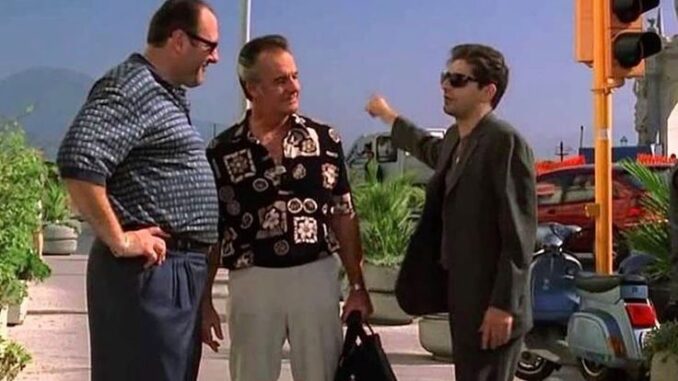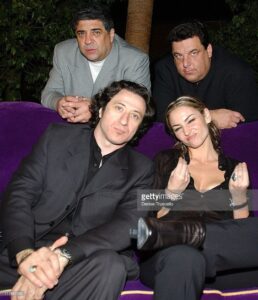
Introduction: The End of The Sopranos and What Could Have Been
The final episode of The Sopranos left fans with more questions than answers. The iconic cut to black at the end of the show’s sixth season remains one of the most debated moments in television history. But while fans speculated about the fate of Tony Soprano, David Chase, the show’s creator, had already moved on to new ideas.
Though The Sopranos was undeniably a crime drama, its lasting impact was rooted in its exploration of family dynamics, psychological depth, and moral ambiguity. So, when David Chase envisioned a new project that could reunite his talented ensemble cast, the idea of a cop show might seem like a natural step, but it was anything but.
David Chase’s Initial Idea for a Cop Show
After The Sopranos concluded, David Chase didn’t immediately jump into new projects. He took his time, reflecting on his next move. During this period, he came up with a concept that would reunite many of the Sopranos cast members—this time, in a radically different setting: a police procedural. Chase envisioned a world where former mobsters turned cops would be navigating their new lives in law enforcement, balancing their old habits with their new roles.

Imagine Tony Soprano, Carmela, Paulie Walnuts, and Silvio Dante donning police uniforms instead of mafia suits. The juxtaposition of their pasts with their present jobs in law enforcement could have made for an interesting blend of crime, drama, and dark humor. It was a high-concept idea that had the potential to revisit familiar characters in a new, exciting way.
Why the Idea Was So Interesting
The idea was captivating for several reasons. First, it would allow The Sopranos fans to see their favorite characters again, with a fresh twist. Secondly, it was a unique way to explore the complex, often contradictory nature of human beings. Can a mobster really leave his past behind and transition into an honest life? Could they use their skills for good, or would their criminal tendencies creep back in? A cop show with this premise would push those boundaries and question the essence of redemption.
Moreover, David Chase, known for his intricate, multi-layered storytelling, could have used this concept to delve even deeper into the psychological and moral conflicts that made The Sopranos such a beloved show. The opportunity for a new spin on familiar themes was undoubtedly appealing.
The Potential for Humor and Drama in a Cop Show
One of the hallmarks of The Sopranos was its perfect balance of humor and drama. Even though the show dealt with heavy topics like organized crime, family dynamics, and mental health, it never shied away from showing the absurdity and humor in everyday life. The same could have been true for the proposed cop show.
A show about former mobsters turned cops would naturally offer opportunities for dark humor. Imagine Paulie Walnuts being forced to work alongside cops who had no idea about his criminal past, or Tony Soprano trying to navigate the bureaucracy of the police force while dealing with his own psychological baggage. The potential for comedic moments, combined with the gritty, often tense nature of police work, could have resulted in a unique, multifaceted show.
The Challenge of Recasting a Mobster as a Cop
While the idea of former mobsters transitioning into cops was exciting, it came with its own set of challenges. Would fans be able to accept these characters in a completely new role? Many Sopranos viewers had become so attached to the mobsters’ identities that it might have been difficult to see them in a different light, even if they were working within the law.
Additionally, the nature of police work—focused on procedure, rules, and a certain level of morality—would conflict with the chaotic, unpredictable lifestyle of a mobster. The characters’ deep flaws, which were such an integral part of The Sopranos, might have been hard to reconcile with their new, law-abiding roles.
Why the Idea Never Came to Life
Despite the intriguing premise, David Chase’s cop show idea never came to fruition. There were several reasons for this. First, there was the challenge of shifting the characters’ personalities from mobsters to law enforcement officers. Additionally, the format of a police procedural, with its strict structure and case-of-the-week format, may not have fit well with the open-ended, character-driven storytelling that made The Sopranos so unique.
Another factor was likely the question of creative integrity. The Sopranos had ended on such a high note, with its deep and complex themes fully explored. Bringing back the cast for a new show might have felt like an attempt to cash in on the success of the original, and that was something David Chase wanted to avoid. He likely felt that revisiting these characters in a completely new setting might dilute the impact of the original show.
The Relevance of The Sopranos Legacy in Today’s TV Landscape
Although the cop show idea never came to life, The Sopranos’ legacy continues to shape the TV industry. Shows that followed, such as Breaking Bad, Mad Men, and The Wire, borrowed heavily from The Sopranos in terms of their character-driven storytelling and moral ambiguity. David Chase set a new standard for how TV dramas could be layered and complex, and the industry has never been the same since.
The Possibility of a Sopranos Revival in a New Format
Even though Chase’s cop show idea never saw the light of day, there have been attempts to bring elements of The Sopranos back in some form. The 2021 prequel movie, The Many Saints of Newark, explored the early days of Tony Soprano’s life, offering a glimpse into his childhood and the people who influenced him. Though it wasn’t a direct continuation of the story, it demonstrated that there was still interest in the Sopranos universe.
Additionally, with the rise of reboots, remakes, and revivals, fans continue to speculate about the potential for more Sopranos content. Whether it’s a spinoff series or a new project entirely, the influence of The Sopranos is undeniable, and David Chase’s original vision for the show will always remain an essential part of its legacy.
Conclusion: The What-Ifs of The Sopranos Universe
David Chase’s idea of turning the Sopranos cast into a group of law enforcement officers might have seemed like a strange and unexpected twist, but it speaks to the complexity of the world he created. While we’ll never know how this concept would have played out, it remains a fascinating footnote in the history of The Sopranos.
In the end, The Sopranos is remembered for its rich storytelling, unforgettable characters, and its groundbreaking influence on television. Whether or not we ever see a cop show starring Tony and his crew, the legacy of this show continues to live on, influencing television and pop culture for years to come.
FAQs
1. Why didn’t David Chase’s cop show idea ever happen?
The cop show idea never came to life due to challenges in reconciling the characters’ mobster identities with the structure of a police procedural, as well as Chase’s desire to avoid tarnishing the original legacy of The Sopranos.
2. How would the Sopranos cast have been different as cops?
As former mobsters, the Sopranos characters would have faced unique challenges transitioning into law enforcement roles, dealing with their criminal past while trying to fit into a more structured, rule-based environment.
3. Could The Sopranos cast have pulled off a cop show?
While the cast had the acting chops, the challenge would have been convincing fans to accept these deeply flawed characters as police officers, which may have been difficult given their well-established personas.
4. What is the legacy of The Sopranos on modern TV?
The Sopranos revolutionized television by focusing on character depth, moral ambiguity, and complex narratives, setting the stage for future critically acclaimed TV dramas like Breaking Bad and Mad Men.
5. Will there ever be more Sopranos content?
While there’s no current news about a direct revival, The Many Saints of Newark prequel proved there’s still interest in the Sopranos universe, and the possibility of a spinoff or continuation is always a subject of speculation.